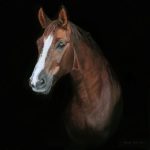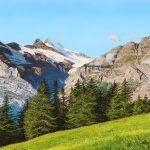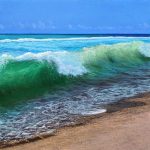Glazing is a technique that I use a lot in my oil paintings. In fact, it is one of the techniques I use to make my oil paintings look more photorealistic. For example, I use glazes when painting shallow rivers and lakes (where you can see the river or lake bed below) to give the water a transparent, shiny and glass-like appearance. Glazes can also be used to make subtle colour changes to already dried layers of oil paint.
What is a glaze?
A glaze is a thin, oily and transparent layer of oil paint, which blends with the oil paint underneath, rather than concealing it. It does this by allowing light to travel through the oil paint and reflect back off the opaque layers below, so that we see a mix of the different colours in each layer.
How to make a glaze and apply it to an oil painting
It’s easy to make a glaze simply by adding a small amount of paint to Liquin Original. The less paint added, the less strength of colour that it has. If it’s warm where you are painting, you may find that you need to keep adding Liquin every other time that you add more paint to your brush, otherwise it will dry too quickly in the heat.
I only apply glazes over the top of a dry base to avoid disturbing the lower layer. However, as I use Winsor & Newton’s fast drying alkyds rather than regular oil paints, I can apply the next layer of glaze to the oil painting sooner. These fast-drying alkyds also have a greater level of transparency than regular oil paints for increased depth and clarity when glazing.
When you apply the first layer of glaze to your oil painting, you may see the underpainting (blocking in) underneath because the paint is so thin. However, this is nothing to worry about as you’ll continue to build up the layers until you reach the colour and effect that you require. Each layer should be allowed to dry before adding another layer of glaze to your oil painting.
Final notes about using glazes for oil painting
Glazed oil colours will always appear deeper and more saturated. If you want to graduate a glaze from dark to light, simply apply the paint more thinly or decrease the ratio of paint to medium.
Glazing may take some time to master, but once you’ve got the hang of it, your paintings will take on a whole new, incredible look. To watch me demonstrate the glazing technique in landscape oil painting, take a look at some of my oil painting tutorial videos below.
#87 How to paint reflections on water
#82 Glazing with oil paints
#73 How to paint tree reflections in water
#44 How to paint a shallow river
If you’d like to learn how to apply glazes with step-by-step video tuition, join my Online Art School today. I’ll show you this technique and many more to help you paint your very own photorealistic oil paintings.







